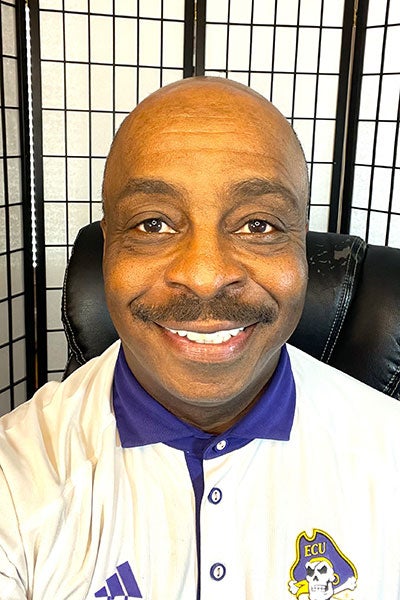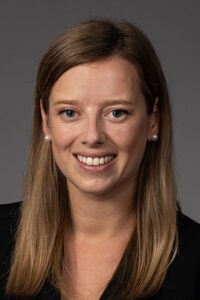Fall 2023 cohort earns graduate certificate in ethnic and rural health disparities
Ten students in the public health and medical graduate programs in the Brody School of Medicine at East Carolina University have earned a certificate in ethnic and rural health disparities (ERHD), equipping them to better care for patients across the region and state.

Dr. Eric Bailey
The ERHD Graduate Certificate Online Program requires completion of four online courses in the discipline and a capstone project on specific issues in ethnic and rural health disparities.
The fall 2023 graduates include Bryant Foriest, Kaitlin Frey, Bridget Gallagher, Courtney Kirchner, Melenis Lopez, Parth Panchal, Emily Parks, Karen Semaan, DJ Smith-Getchell and Latasha Stabler.
“This latest group of ERHD certificate graduates is very special because they are not only the largest graduate cohort of the program, but they are also an excellent mix of public health and medical professionals, along with the most impactful capstone projects and proposal, which are designed to solve public health and medical issues in eastern North Carolina,” said Dr. Eric Bailey, who directs the certificate program alongside Dr. Justin Moore. “The Brody medical students have fully embraced the new approach in analyzing, conducting research and developing new medical interventions for our diverse, rural ethnic populations in eastern North Carolina.”
The ERHD online certificate program has been recognized by the U.S. Department of Health and Human Services’ Health Resources and Services Administration and serves as Brody’s medical student distinction track in service learning. The program’s four courses cover topics including African American health, global public health, ethnic health and health disparities, and a capstone experience.
The program is designed to use the online, distance education infrastructure within ECU and the UNC system to improve public health professionals’ skills in cultural competency and to better prepare public health graduates in the five major rural health disparity issues such as cancer, heart disease, substance abuse, smoking and HIV/AIDS. Upon completion of the 12 semester hours, graduates will not only have improved their knowledge, attitude and skills in relationship to the major ethnic and rural health disparity issues, but also will have acquired new public health skill sets that will make them more marketable and employable in today’s public health, allied health, nursing and medical fields.

The certificate in ethnic and rural health disparities is another effort by the Brody School of Medicine to address the health challenges facing rural North Carolinians. The school’s mobile unit takes to the road to take health care to rural patients. (Photo by Cliff Hollis)
The program, which began in fall 2010, now has more than 80 graduates.
Gallagher, a fourth-year medical student in the fall cohort, said the ERHD certificate adds perspective to her future career as a physician.
“The ERHD certificate program gave me the time and space, amidst the rigors of medical school, to see beyond the patient sitting in front of me and consider all of the forces affecting their health outside clinic walls,” she said. “We were encouraged to put ourselves out into the community, to build relationships, to question history, to learn new cultural belief systems, to contemplate the past and present role of racism and to challenge our own pre-existing biases towards our patients, our future colleagues and ourselves.

Medical student Emily Parks
“Each of us walked away with tangible next steps on how we as health professionals might promote health equity and fight against institutional and individual racism, be it five minutes down the road or on the other side of the globe.”
Bailey said the ability for students to gain that kind of knowledge as they begin their careers is why he began the program in the first place.
“I find the most rewarding aspect of preparing and training the next generation of health care professionals at ECU is their genuine surprise, joy, passion and desire to make a positive impact on the health status of eastern North Carolina,” said Bailey, who teaches all the courses in the program. “I strongly encourage them and push them to think outside of the box and create a new way in viewing their patient population and treating their patient population, if they want to make a difference. Each ERHD graduate becomes more marketable and employable in the job market with the new set of skills that they acquired from our program.”
Health departments and medical clinics across the region, he added, are consistently interested in collaborating with the program and connecting with potential employees.
Bailey, a joint-appointed professor in public health and anthropology at ECU since 2005, leveraged his experience as an applied medical anthropologist and his work with the National Institutes of Health, the National Cancer Institute and the National Center on Minority Health and Health Disparities, to develop the program. The goal was to introduce an additional facet to health education that meets the needs of today’s medical and public health professionals.
Bailey said the ERHD certificate program was designed to align with the missions of the university and medical school.
“Its mission is to use the latest online technology to assist medical health professionals and public health administrators in not only obtaining additional expertise in ethnic and rural health disparities, but also in developing culturally competent solutions for specific health disparity populations,” he said. “Our ERHD programs includes graduate professionals from all 16 of the UNC system universities — not just ECU.”
Parks, a cohort member and fourth-year medical student, said her experience in the program will strengthen her future as a Brody doctor.
“I will treat many patients with experiences different from my own in my career as a physician, and the ERHD certificate provides an opportunity to learn about the historical backgrounds and current challenges of different populations so that I am better equipped to connect with and guide them as a physician,” she said. “I feel better prepared to identify and address barriers to care that may be unique to certain populations or communities.”